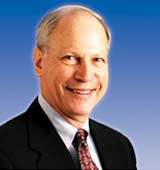|
Executive Interviews: Interview with Michael Beer on Change Management
June 2007
-
By Dr. Nagendra V Chowdary
 Michael Beer
Michael Beer
Cahners-Rabb Professor of Business Administration, Emeritus at the Harvard Business School, Chairman and co-founder of TruePoint a research based consultancy.

It is not hard to theorize about change
because I started with the grounded
experience of working with managers
to help them change their
organizations (see their challenges
above), observing and documenting
success and failures (one has to be
honest with oneself and fact-based as
a scholar consultant and/or ask others
to join the team who are less involved
as consultants) through cases, survey
data, participant observations and
then using cross-sectional analysis of
multiple documented cases to lift out
of them key causes for success or
failure and then forming connections
between these key success factors to
develop theory.
|
|
In other instances, I
was simply a researcher using
Interviews and survey data in
organizations with varied success and
then connecting the dots to develop
theory (Beer M. et. al. (1990) The
Critical Path to Corporate Renewal,
Harvard Business School Press). In yet
a third approach (the change formula),
INTERVIEW 4
I used a formulation developed by
someone else for a different context
(individual change) and used my
experience with change to develop
this formulation for organization
change. -
What should be the logical
expected outcomes of change
management initiatives? After all,
most of the change initiatives are
responses to impending problems?
Problems, as you suggest, are often
shaped by the situation poor perfor
mance or an ineffective organization.
Problems in performance or behavior
gaps between managerial intent and
actual performance and behavioral
outcomes always (even when these
may not be manifest) give rise to
change (dissatisfaction with the status
quo). Leaders with low standards do
not stimulate change because gaps
between their intent and reality do not
become manifest. Of course, goals and
values are not always known to the
leader or they are only vaguely
understood. We as academics and/or consultants
have our own values. Each society has
different values they ascribe to
numerous potential organizational
outcomes. Japanese managers have
different assumptions about desirable
outcomes than American managers
and these differences reflect both
personal and societal values. In
developing a theory and
recommending interventions and
actions to leaders we in academia
need to be clear about the outcomes
that are likely to occur. See Beer and
Nohria (2000) Breaking the Code of
Change, Harvard Business School
Press, and Beer and Nohria, (2000)
Cracking the Code of Change, Harvard
Business Review, for the development
of a conceptual framework that
specifies different outcomes of two
different strategies. What good
consultants do is help leaders clarify
goals and values before developing
the approach to change. -
However, we also notice occasional
change initiatives that are proactive in
nature. For instance, when Reg Jones
handed over GE's mantle to Jack
Welch in 1981, GE was doing pretty
fine. Yet, Jack Welch institutionalized
organization wide change initiatives
that catapulted the company in all the
performance metrics. Which are,
therefore, more important; reactive
change initiatives or proactive change
initiatives?
I agree with your observation about
Reg Jones at GE. Yes his selection of
Jack Welch gave rise to proactive
change, but I believe the same
dynamic I described in my answers to
the previous questions was operating.
Reg Jones was dissatisfied with where
GE was heading to or how it might fare
in the future given his view of where
the environment in which GE would
have to operate in the next 20 years
was going. This is proactive change
and is always desirable because
financial and human costs of reactive
change are very high. So, proactive
change is a function of a gap between
managerial intent and the reality they
see now or in the future. Leaders who
do not initiate proactive change will
never build a great company (like GE
and Southwest Airlines). They are
mediocre managers who lead
mediocre businesses.
1.
Change Management Case Studies
2. ICMR
Case Collection
3.
Case Study Volumes
|
